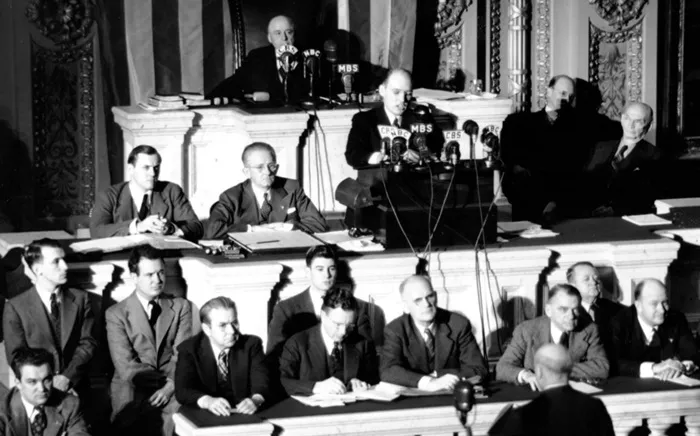December 11 has witnessed a multitude of significant events throughout American history, spanning wars, political decisions, and cultural milestones. This article will explore several key occurrences on this date, providing detailed context and implications for each event.
What Happened on December 11 in American History?
1. U.S. Declares War on Germany (1941)
On December 11, 1941, Adolf Hitler declared war on the United States. This declaration followed the Japanese attack on Pearl Harbor just days earlier, which had prompted the U.S. to enter World War II. Hitler’s decision was based on an agreement with Japan, believing that by joining the conflict against the U.S., he could strengthen the Axis powers’ position in the war.The declaration was handed to U.S. Secretary of State Cordell Hull by the German charge d’affaires in Washington. In response, the United States declared war on Germany and Italy later that same day. This marked a pivotal moment in World War II, as it solidified the U.S. commitment to defeating Axis powers and significantly altered the dynamics of the war.
The implications of this declaration were profound. The United States mobilized its vast industrial and military resources, leading to major offensives in both Europe and the Pacific. The entry of the U.S. into World War II also marked a shift in global power dynamics, as it would emerge from the war as one of the two superpowers alongside the Soviet Union.
2. Establishment of UNICEF (1946)
On December 11, 1946, the United Nations International Children’s Emergency Fund (UNICEF) was established. This organization was created in response to the widespread suffering of children in post-World War II Europe and around the world. Initially focused on providing food and healthcare to children affected by war, UNICEF has since expanded its mission to include education, protection from violence, and advocacy for children’s rights globally.UNICEF’s establishment marked a significant step towards international cooperation aimed at improving child welfare. It has played a crucial role in addressing issues such as malnutrition, disease prevention, and education access for millions of children worldwide.
3. The Abdication of King Edward VIII (1936)
While not directly related to American history, December 11 is notable for the abdication of King Edward VIII from the British throne in 1936. Edward VIII’s desire to marry American divorcée Wallis Simpson led to a constitutional crisis in Britain. His abdication was formally approved on this day and made him the only British monarch to voluntarily resign.This event had implications for American-British relations and highlighted cultural differences regarding marriage and monarchy during that era. Edward’s abdication paved the way for his brother George VI to ascend to the throne, eventually leading to Queen Elizabeth II’s reign.
4. The Largest Cash Heist in U.S. History (1978)
On December 11, 1978, nearly $6 million in cash and jewels were stolen from a Lufthansa cargo building at John F. Kennedy International Airport in New York City. This heist became known as the Lufthansa heist and was orchestrated by a mobster associated with organized crime.The theft was significant not only for its scale but also because it highlighted vulnerabilities in airport security at that time. The Lufthansa heist remains one of the largest cash thefts in U.S. history and has been referenced in various media portrayals of organized crime.
5. Bernard Madoff Arrested (2008)
On December 11, 2008, Bernard Madoff was arrested for running a massive Ponzi scheme that defrauded investors out of billions of dollars. Madoff’s firm promised consistent high returns that were unsustainable and ultimately collapsed when he could no longer pay out investors.The fallout from Madoff’s arrest had widespread implications for financial regulation and investor confidence in markets. It exposed significant weaknesses in oversight mechanisms within financial institutions and led to calls for reforms aimed at preventing similar frauds in the future.
6. Supreme Court Decision on Florida Recount (2000)
Another significant event occurred on December 11, 2000, when the U.S. Supreme Court effectively awarded the presidency to George W. Bush by ruling that a fair recount of ballots in Florida could not be conducted within the time constraints set by federal law. This decision followed a contentious election that had seen Bush narrowly defeat Al Gore.The ruling underscored issues related to electoral processes and voting rights in America. It raised questions about how elections are conducted and counted, leading to ongoing debates about electoral reform.
Conclusion
The events that have transpired on December 11 throughout American history reflect critical moments that have shaped both domestic policy and international relations. From declarations of war to landmark legal decisions and cultural milestones, this date serves as a reminder of America’s complex historical narrative.In conclusion, understanding these events provides valuable insights into how historical contexts influence current societal norms and political landscapes within America today. This article serves as an overview of significant historical events occurring on December 11 across various years while maintaining clarity through simple clauses for better comprehension.
Related Topics:

